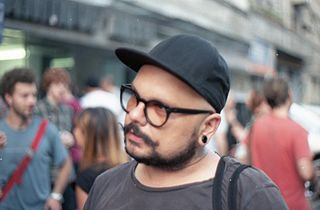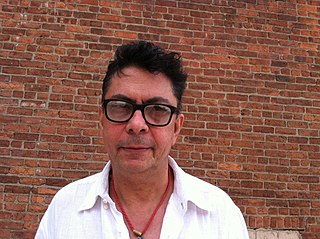
Anjolie Ela Menon is one of India's leading contemporary artists. Her paintings are in several major collections, including the NGMA, the Chandigarh Museum and the Peabody Essex Museum. In 2006, her triptych work "Yatra" was acquired by the Asian Art Museum of San Francisco, California. Other works also been a part of group exhibitions including 'Kalpana: Figurative Art in India', presented by the Indian Council for Cultural Relations (ICCR) in London's Aicon Gallery in 2009. Her preferred medium is oil on masonite, though she has also worked in other media, including Murano glass, computer graphics and water colour. She is a well known muralist. She was awarded the Padma Shree in 2000. She lives and works in New Delhi.

Sayed Haider Raza was an Indian painter who lived and worked in France for most of his career. Born on 22 February 1922 in Kakkaiya, Central Provinces, British India, Raza moved to France in 1950, marrying the French artist Janine Mongillat in 1959. Following her death from cancer in 2002, Raza returned to India in 2010, where he would live until his death on 28 July 2016.

Shishir Bhattacharjee is a Bangladeshi artist. His paintings, critical of the political establishment but always in a satirical fashion, were first seen in the 1980s. His political cartoons appear regularly in daily newspapers in Bangladesh. During the past couple of years, he has produced paintings that appropriate images from Bengali film posters, altered to serve his social and political messages.

The Power Plant Contemporary Art Gallery is a Canadian public art gallery located at Harbourfront Centre in the heart of Toronto, Ontario, Canada. The Gallery is a registered Canadian charitable organization.
Sonia Khurana is an Indian artist. She works with lens-based media: photo, video, and the moving image, as well as performance, text, drawing, sound, music, voice, and installation.
Haku Vajubhai Shah was an Indian painter, Gandhian, cultural anthropologist and author on folk and tribal art and culture. His art belonged to the Baroda Group and his works are considered in the line of artists who brought themes of folk or tribal art to Indian art.

Răzvan Ion is an intersectional innovator, academic curator, tech queer activist, introspective journalist and professor of critical thinking. He is best known for leading the DerAffe Vienna team in creating A.I. JARVIS, the first artificial intelligence curator in history and Gay 45, a European queer magazine.

Chittrovanu Mazumdar is a contemporary Indian artist of Bengali-Indian and French descent. Mazumdar has been described as a "conceptual artist" and a "post-structuralist" while some critics consider it difficult to classify his oeuvre into a single artistic tradition or even into any consistent genre of his own. Mazudmar has referred to himself as an "expressionist painter" but has also said he generally prefers not to use "a particular word to qualify" his work because it comprises different kinds of media and forms, and that art is more interesting when fully given over to the viewer's own experience rather than constrained by the prescriptive power of labels.

Riyas Komu is an Indian multimedia artist and curator based in Mumbai. He has invested his time in art education and developing art infrastructure in India. Komu's works are inspired by social conflicts and political movements and topics like migration and displacement. His hyper-realistic oil portraits of people resemble socialist-realist propaganda art, with one of his portraits titled Why Everybody should Look Like Mao.
Naeem Mohaiemen uses film, photography, installation, and essays to research South Asia's postcolonial markers. His projects on the 1970s revolutionary left explored the role of misrecognition within global solidarity.

Rajeeb Samdani is a Bangladeshi industrialist and art collector. As of 2021, he is the managing director of Golden Harvest Group, a Bangladeshi conglomerate, and the founder and trustee of Samdani Art Foundation which produces the Dhaka Art Summit.
Dhaka Art Summit is an art summit held in Dhaka, Bangladesh and is organised by Samdani Art Foundation, a non- profit art infrastructure development organisation founded by Nadia Samdani and Rajeeb Samdani in 2011.

The Samdani Art Foundation is a private art foundation founded in 2011 in Dhaka, Bangladesh that aims to increase artistic engagement between the art and architecture of Bangladesh and the rest of the world. It is best known for producing the bi-annual Dhaka Art Summit, which is the highest daily visited contemporary art exhibition in the world, welcoming over 477,000 visitors in its fifth edition in February 2020. It completed its sixth edition in 2023. The foundation produces education programmes and exhibitions across the year in collaboration with Bangladeshi and international institutions and is one of the most active art institutions in South Asia.

National Gallery of Modern Art, Mumbai was opened to the public in 1996. It hosts various exhibitions and art collections of famous artists, sculptors and different civilizations. It is situated in the Cowasji Jehangir Hall, near Regal Cinema in Colaba.

Art Dubai is an international art fair that takes place every March in Dubai. Founded in 2007, Art Dubai is a major platform for art from the Middle East, North Africa and South Asia. Each year, the fair features a globally diverse lineup of over 90 galleries from more than 40 different countries,
Soumya Sankar Bose is an Indian documentary photographer. In his practice he uses photography, archival material and text to explore desire, identity and memory. His first book 'Where the Birds Never Sing(2020)' is on Marichjhapi massacre, the forcible eviction in 1979 of lower caste Bengali refugees on Marichjhapi Island in Sundarban, India, and the subsequent death of thousands by police gunfire, starvation, and disease. The Book was shortlisted for the First Photobook award in the Paris Photo–Aperture Foundation PhotoBook Awards 2020. Soumya Sanker Bose was awarded Magnum Foundation's Social Justice Fellowship for Full Moon on a Dark Night in 2017, was Hello! India's Emerging Artist of the Year in 2023, and received the Louis Roederer Discovery Public Award at Les Rencontres d'Arles for A Discreet Exit Through Darkness in 2023.
The NinKi: Urgency of Proximate Drawing Photograph (NinKi:UoPDP) was initiated by Bangladeshi visual artist Firoz Mahmud. This is a drawing photograph project to rhetorically rescue popular icons with geometric structure drawings or make photo image of the people tactically static. His pigeonhole or kind of compartmental examples of doodling were engaged on found images in various printed media and also were found in his sketchbook, books, notebooks and often in his borrowed books. The word 'Ninki' (人気) is a Japanese word which means be Popular or popularity. The Ninki: UoPDP art Project of drawing on photographs consist of numerous archetypal images of popular celebrities in vague appearance. Their career, character, fame, obscurity, activities and character are insurgent and idiosyncratic. Artist Firoz has started on any image and then specifically on Bengal tiger and more significantly on Japanese Sumo Wrestler as artist based in Japan and fascinated by sports, media and interested on humorous aspect of entertainment industries.
Bani Abidi is a Pakistani artist working with video, photography and drawing. She studied visual arts at the National College of Arts in Lahore and at the School of the Art Institute of Chicago. In 2011, she was invited for the DAAD Artists-in-Berlin program, and since then has been residing in Berlin.

Shipra Bhattacharya is an Indian artist from Kolkata, known for her figurative paintings of women in domestic, urban, and natural environments. Her work has been exhibited in India and internationally.

Oindrilla Maity Surai is an Indian independent curator, art critic, and pedagogue based in Kolkata. She has curated exhibitions beyond the paradigms of the commercial gallery. Her major contributions lie in her converting the exhibition spaces as sites of resistances in the post-Covid 19 era, following the country's political conditions and experimenting with the anatomy of what may be termed as the biennale mode of exhibition making in the city's public sphere. She has also participated in several community- based art projects as an artist.















